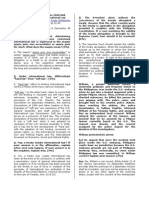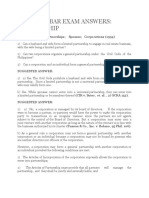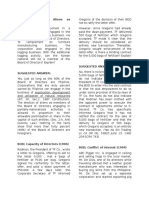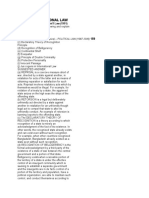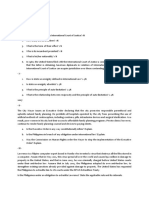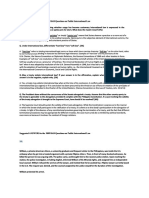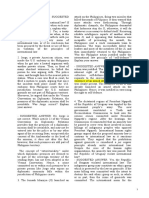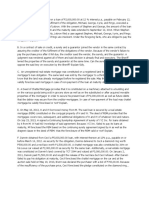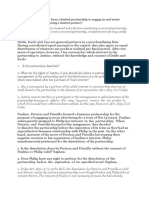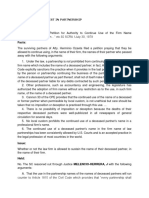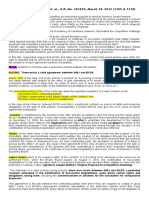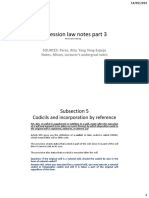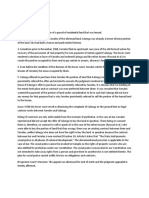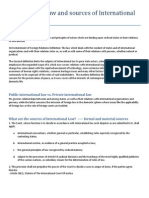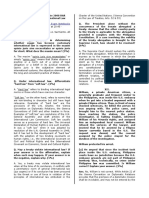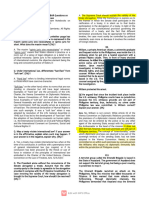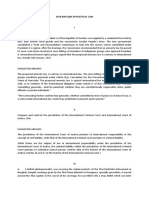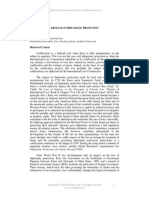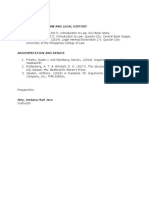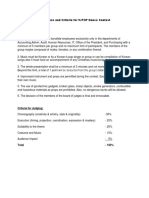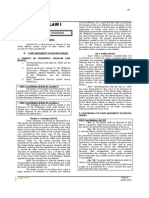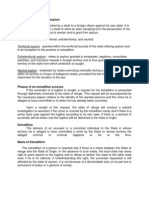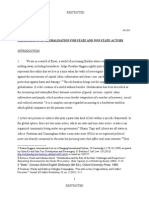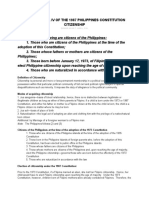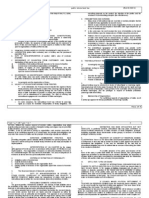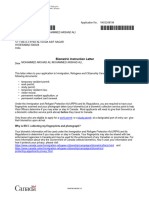Bar Questions On Public International Law PDF
Bar Questions On Public International Law PDF
Uploaded by
Jorge ParkerCopyright:
Available Formats
Bar Questions On Public International Law PDF
Bar Questions On Public International Law PDF
Uploaded by
Jorge ParkerOriginal Title
Copyright
Available Formats
Share this document
Did you find this document useful?
Is this content inappropriate?
Copyright:
Available Formats
Bar Questions On Public International Law PDF
Bar Questions On Public International Law PDF
Uploaded by
Jorge ParkerCopyright:
Available Formats
lOMoARcPSD|2976113
214570160 BAR Questions on Public International Law
Interior Architecture and Design Competitions (Coventry University)
StuDocu is not sponsored or endorsed by any college or university
Downloaded by J Parker (ilovejorgeparker@gmail.com)
lOMoARcPSD|2976113
Suggested ANSWERS to the 2008 BAR Questions on Public International Law
The legal yardstick in determining whether usage has become customary international law is expressed in the maxim opinio
juris sive necessitates or opinio juris for short. What does the maxim mean? (3%)
The maxim “opinio juris sive necessitates” or simply “opinio juris” means that States observe a practice or a norm out of a sense
of legal obligation or a belief in its juridical necessity. Opinio juris is the subjective element of international customs, the
objective element being the long and consistent practice of States.
Under international law, differentiate “hard law” from “soft law”. (3%)
“Hard law” refers to binding international legal norms or those which have coercive character. “Soft law,” on the other hand, refers to
norms that are non-binding in character but still have legal relevance. Examples of “hard law” are the provisions of the
U.N. Charter, the Vienna Convention on Diplomatic Relations, the Geneva Conventions of 1949 and other treaties in force.
Examples of “soft law” are resolutions of the U.N. General Assembly and draft articles of the International Law Commission.
Soft law usually serves as a precursor of hard law. The Universal Declaration of Human Rights is one such example. It was a “soft
law” when it was adopted by resolution of the U.N. General Assembly in 1948, but it has led to the development of “hard law”
with the adoption of two binding covenants on human rights, i.e., the International Covenant on Civil and Political Rights and
the International Covenant on Economic, Social and Cultural Rights.
May a treaty violate international law? If your answer is in the affirmative, explain when such may happen. If your answer is
in the negative, explain why. (5%)
Yes, a treaty may violate international law when at the time of its conclusion, it conflicts with a peremptory norm of general
international law (jus cogens) or if its conclusion has been procured by the threat or use of force in violation of the principles of
international law embodied in the Charter of the United Nations. (Vienna Convention on the Law of Treaties, Arts. 52 & 53)
The President alone without the concurrence of the Senate abrogated a treaty. Assume that the other country-party to the
treaty is agreeable to the abrogation provided it complies with the Philippine Constitution. If a case involving the validity of
the treaty abrogation is brought to the Supreme Court, how should it be resolved? (6%)
Downloaded by J Parker (ilovejorgeparker@gmail.com)
lOMoARcPSD|2976113
The Supreme Court should sustain the validity of the treaty abrogation. While the Constitution is express as to the manner in
which the Senate shall participate in the ratification of a treaty, it is silent as to that body's participation in the abrogation of a
treaty. In light of the absence of any constitutional provision governing the termination of a treaty, and the fact that different
termination procedures may be appropriate for different treaties, the case must surely be controlled by political standards,
even more so because it involves the conduct of foreign relations.
Suggested ANSWERS to the 2009 BAR Questions on Public International Law
XII.
William, a private American citizen, a university graduate and frequent visitor to the Philippines, was inside the U.S. embassy
when he got into a heated argument with a private Filipino citizen. Then, in front of many shocked witnesses, he killed the
person he was arguing with. The police came, and brought him to the nearest police station. Upon reaching the station, the
police investigator, in halting English, informed William of his Miranda rights, and assigned him an independent local
counsel. William refused the services of the lawyer, and insisted that he be assisted by a Filipino lawyer currently based in
the U.S. The request was denied, and the counsel assigned by the police stayed for the duration of the investigation.
William protested his arrest.
Downloaded by J Parker (ilovejorgeparker@gmail.com)
lOMoARcPSD|2976113
[a] He argued that since the incident took place inside the U.S. embassy, Philippine courts have no jurisdiction because the
U.S. embassy grounds are not part of Philippine territory; thus, technically, no crime under Philippine law was committed. Is
William correct? Explain your answer. (3%)
Ans. No, William is not correct. While Article 22 of the Vienna Convention on Diplomatic Relations provides that the premises of
a diplomatic mission shall be inviolable, and may not be entered by the police or by any other agent of the receiving State,
except with the consent of the Ambassador or the head of the mission, it does not alter the fact, however, that such premises
are still part of Philippine territory. The concept of “exterritoriality,” under which diplomatic premises are deemed to be part of
the sovereign territory of the sending State, has not been adopted in the Vienna Convention. Hence, a crime committed on or
within such premises by a private person like Williams who enjoys no diplomatic immunity falls within the jurisdiction of
Philippine courts.
XIII.
A terrorist group called the Emerald Brigade is based in the State of Asyaland. The government of Asyaland does not support
the terrorist group, but being a poor country, is powerless to stop it.
The Emerald Brigade launched an attack on the Philippines, firing two missiles that killed thousands of Filipinos. It then
warned that more attacks were forthcoming. Through diplomatic channels, the Philippines demanded that Asyaland stop the
Emerald Brigade; otherwise, it will do whatever is necessary to defend itself.
Receiving reliable intelligence reports of another imminent attack by the Emerald Brigade, and it appearing that Asyaland
was incapable of preventing the assault, the Philippines sent a crack commando team to Asyaland. The team stayed only for
a few hours in Asyaland, succeeded in killing the leaders and most of the members of the Emerald Brigade, then
immediately returned to the Philippines.
*a+ Was the Philippine action justified under the international law principle of “self-defense”? Explain your answer. (3%)
Ans. Yes, the Philippine action was justified. Article 51 of the U.N. Charter affirms the inherent right of States to individual or
collective self-defence.
Downloaded by J Parker (ilovejorgeparker@gmail.com)
lOMoARcPSD|2976113
The terrorist group Emerald Brigade had already launched actual armed attacks on the Philippines which killed thousands of
Filipinos with a warning that more attacks were forthcoming. Asyland, on the other hand, had failed to fulfill its obligations,
under international law, to prevent the use of its territory for the staging of terrorist acts against the Philippines. As such, in the
face of another imminent attack by the Emerald Brigade, and it appearing that Asyland was incapable of preventing the assault,
the Philippines was therefore justified in resorting to military action to protect its own security as an act of self-defence.
[b] As a consequence of the foregoing incident, Asyaland charges the Philippines with violation of Article 2.4 of the United
Nations Charter that prohibits “the threat or use of force against the territorial integrity or political independence of any
State.” The Philippines counters that its commando team neither took any territory nor interfered in the political processes
of Asyaland. Which contention is correct? Reasons. (3%)
Ans. The contention of the Philippines is the correct one. State practice and the U.N. Security Council's actions after 9/11
indicate a trend towards recognizing that a State that suffers large-scale violence perpetrated by non-State actors located in
another State has a right to use force when (1) that other State proves unwilling or unable to reduce or eliminate the source of
the violence, (2) the use of force is proportional to the threat posed by the non-State actor, and (3) the use of force is
temporary and does not result in non-consensual occupation or annexation of territory.
Downloaded by J Parker (ilovejorgeparker@gmail.com)
lOMoARcPSD|2976113
Under UN/A/RES/60/288 (2006), known as the UN global counter-terrorism strategy, member States shall adopt a plan of
action, including a number of measures to prevent and combat terrorism, in particular by denying terrorists access to the
means to carry out their attacks, to their targets and to the desired impact of their attacks.
[c] Assume that the commando team captured a member of the Emerald Brigade and brought him back to the Philippines.
The Philippine Government insists that a special international tribunal should try the terrorist. On the other hand, the
terrorist argues that terrorism is not an international crime and, therefore, the municipal laws of the Philippines, which
recognize access of the accused to constitutional rights, should apply. Decide with reasons. (3%)
Ans. Terrorism is an international crime both in times of peace and in times of armed conflicts, and therefore it may be tried by
a special international tribunal. The municipal laws of the Philippines cannot apply because the terrorist acts in question are
transnational in nature; that is, not limited to the territory of the Philippines and they do not fall under the extraterritorial
criminal jurisdiction of the Philippines under Article 2 of the Revised Penal Code.
When committed during peacetime, international terrorism may be prosecuted under the different international conventions
on the prevention, suppression and punishment of terrorism, and when committed during an armed conflict, it may be
prosecuted as a distinct category of war crimes. International law indisputably bans terrorism in time of armed conflict. Article
33(1) of the Fourth Geneva Convention of 1949 prohibits “all measures of terrorism against civilians.” A similar provision is
contained in the Second Additional Protocol of 1977. Article 4(2)(d) prohibits “acts of terrorism” against all persons who do not
take a direct part or have ceased to take part in hostilities.
XIV.
The Philippine Government is negotiating a new security treaty with the United States which could involve engagement in joint
military operations of the two countries’ armed forces. A loose organization of Filipinos, the Kabataan at Matatandang
Makabansa (KMM) wrote the Department of Foreign Affairs (DFA) and the Department of National Defense (DND)
demanding disclosure of the details of the negotiations, as well as copies of the minutes of the meetings. The DFA and the
DND refused, contending that premature disclosure of the offers and counter-offers between the parties could jeopardize
on-going negotiations with another country. KMM filed suit to compel disclosure of the negotiation details, and be granted
Downloaded by J Parker (ilovejorgeparker@gmail.com)
lOMoARcPSD|2976113
access to the records of the meetings, invoking the constitutional right of the people to information on matters of public
concern.
[a] Decide with reasons. (3%)
Ans. The suit filed by KMM should be dismissed. It is true that the details of the treaty negotiation, including the offers and
counter-offers between the Philippine Government and United States, are matters of public concern. However, it is also well-
established in jurisprudence that neither the right to information nor the policy of full public disclosure is absolute, there being
matters which, albeit of public concern or public interest, are recognized as privileged in nature.
As held in the recent case of Akbayan vs. Aquino (G.R. No. 170516, July 16, 2008), the privileged character of diplomatic
negotiations has been recognized in this jurisdiction. In discussing valid limitations on the right to information, the Supreme
Court in Chavez v. PCGG (360 Phil. 133, 764 *1998+) held that “information on inter-government exchanges prior to the
conclusion of treaties and executive agreements may be subject to reasonable safeguards for the sake of national interest.”
Even earlier, the same privilege was upheld in People’s Movement for Press Freedom (PMPF) v. Manglapus (G.R. No. 84642,
September 13, 1988) wherein the Supreme Court stressed that “secrecy of negotiations with foreign countries is not violative of
the constitutional provisions of freedom of speech or of the press nor of the freedom of access to information.”
[b] Will your answer be the same if the information sought by KMM pertains to contracts entered into by the Government in
its proprietary or commercial capacity? Why or why not? (3%)
Downloaded by J Parker (ilovejorgeparker@gmail.com)
lOMoARcPSD|2976113
Ans. No, the answer will be different. Information pertaining to contracts entered into by the Government in its proprietary or
commercial capacity are not covered by the doctrine of executive privilege. These information are matters of public concern to
which the people have the right to information under Section 7 of the Bill of Rights. Under Section 7, citizens shall be afforded
access to official records, and to documents, and papers pertaining to government transactions. Moreover, Section 28 of the
Declaration of Principles directs the State to adopt and implement a policy of full public disclosure of all its transactions
involving public interest.
Suggested ANSWERS to the 2010 BAR EXAM Questions on Public International Law
I.
The dictatorial regime of President A of the Republic of Gordon was toppled by a combined force led by Gen. Abe,
former royal guards and the secessionist Gordon People’s Army. The new government constituted a Truth and
Reconciliation Commission to look into the serious crimes committed under President A’s regime. After the hearings, the
Commission recommended that an amnesty law be passed to cover even those involved in mass killings of members of
indigenous groups who opposed President A. International human rights groups argued that the proposed amnesty law is
contrary to international law. Decide with reasons. (4%)
Suggested Answer:
Downloaded by J Parker (ilovejorgeparker@gmail.com)
lOMoARcPSD|2976113
The proposed amnesty law is contrary to international law.
The indigenous group may constitute an ethnic group which is protected by the law on Genocide. If the mass killing was
committed with the intent to destroy (dolus specialis) the said ethnic group as such, in whole or in part, then the crime of
Genocide was committed. The international norm for the prevention, prosecution and punishment of Genocide is a peremptory
(just cogens) norm of international law and, therefore, non-derogable. (Prosecutor v. Blagojevic and Jokic, ICTY, January 17,
2005)
Even if the mass killing was not committed with the dolus specialis to destroy the ethnic group as such, the same may still
constitute the Crime Against Humanity of Extermination if the mass killing was widespread and systematic or the War Crime of
Intentionally Attacking Civilians if the same took place in the context of or was associated with an armed conflict. The norm for
the prevention, prosecution and punishment of crimes against humanity and war crimes are also customary norms of international
and therefore binding on all States. (Prosecutor v. Stakic, ICTY, July 31, 2003)
Thus, Republic of Gordon has the obligation under international law to prosecute and punish all those involved in the mass
killing of the members of the indigenous group and providing amnesty to those involved is violative of this obligation.
II.
Downloaded by J Parker (ilovejorgeparker@gmail.com)
lOMoARcPSD|2976113
Compare and contrast the jurisdiction of the International Criminal Court and International Court of Justice. (3%)
Suggested Answer:
The jurisdiction of the International Criminal Court (ICC) primarily deals with the prosecution of individuals for core
international crimes, while the jurisdiction of the International Court of Justice (ICJ) deals with contentious proceedings between
States.
As to subject matter jurisdiction (ratione materiae), the jurisdiction of the ICC is limited to the most serious crimes of concern to
the international community as a whole, particularly: (a) the Crime of Genocide; (b) Crimes against Humanity; (c) War crimes;
and (d) the Crime of Aggression. (R. Sarmiento, Public International Law Bar Reviewer, 2009 Revised Edition, p. 308). On the
other hand, the jurisdiction of the ICJ covers legal disputes which the States refer to it. This includes disputes concerning: (a) the
interpretation of a treaty; (b) any question of international law; (c) the existence of any fact which, if established, would
constitute a breach of an international obligation; and (d) the nature or extent of the reparation to be made for the breach of an
international obligation. (Article 36, ICJ Statute) The ICJ also has jurisdiction to give an advisory opinion on any legal question
as may be requested by the General Assembly or the Security Council or on legal questions arising within the scope of the
activities of other organs and specialized agencies of the U.N. upon their request and when so authorized by the General
Assembly. (Article 96, U.N. Charter)
Downloaded by J Parker (ilovejorgeparker@gmail.com)
lOMoARcPSD|2976113
As to jurisdiction over the persons or parties (ratione personae), the ICC shall have the power to exercise its jurisdiction over
persons for the most serious crimes of international concern, and shall be complementary to national criminal jurisdictions. (Art.
1, Rome Statute) On the other hand, only States may be parties in cases before the ICJ and their consent is needed for the ICJ to
acquire jurisdiction. (R. Sarmiento, Public International Law Bar Reviewer, 2009 Revised Edition, p. 185)
III.
A, a British photojournalist, was covering the violent protests of the Thai Red-Shirts Movement in Bangkok. Despite
warnings given by the Thai Prime Minister to foreigners, specially journalists, A moved around the Thai capital. In the
course of his coverage, he was killed with a stray bullet which was later identified as having come from the ranks of the
Red-Shirts. The wife of A sought relief from Thai authorities but was refused assistance.
Is there state responsibility on the part of Thailand? (2%)
What is the appropriate remedy available to the victim’s family under international law? (3%)
Downloaded by J Parker (ilovejorgeparker@gmail.com)
lOMoARcPSD|2976113
Suggested Answer:
No, there is no state responsibility on the part of Thailand because the acts of the Thai Red-Shirts were not the acts of Thailand.
Under the Principle of Attribution or Imputation, a State only incurs liability for individual acts or omission which can be
attributed to it. The Thai Red-Shirts are not its officials, agents, or representatives and they were not acting on the instructions
of, or under the direction or control of, the Thai Government. (R. Sarmiento, Public International Law Bar Reviewer, 2009
Revised Edition, pp. 65-66)
Unless the Red-Shirts becomes the new Government of Thailand or Thailand acknowledges and adopts the conduct of the Red-
Shirts as its own, the victim’s family has no appropriate remedy under international law. Their remedy, if any, if only available
under the domestic laws of Thailand by the institution of the appropriate criminal cases against the persons responsible for A’
killing and the filing of an action to recover damages arising from A’s death.
IV.
Choose the statement which appropriately completes the opening phrase:
“A State which resorts to retorsion in international law
Downloaded by J Parker (ilovejorgeparker@gmail.com)
lOMoARcPSD|2976113
must ensure that all states consent to its act.”
cannot curtail migration from the offending state.”
can expel the nationals of the offending state.”
should apply proportionate response within appreciable limit.”
None of the above.
Explain your answer. (2%)
Suggested Answer:
D. “A State which resorts to retorsion in international law should apply proportionate response within appreciable limits.”
Downloaded by J Parker (ilovejorgeparker@gmail.com)
lOMoARcPSD|2976113
Retorsion consists in retaliation where the acts complained of do not constitute a legal ground of offense but are rather in the
nature of unfriendly acts done primarily in pursuance of legitimate State interests but indirectly hurtful to other States. (R.
Sarmiento, Public International Law Bar Reviewer, 2009 Revised Edition, p. 233)
To be valid in international law, acts of retorsion should not be excessive when compared to the unfriendly acts committed by the
offending State. Moreover, they should not violate a State’s obligation under Article 2(3) of the U.N. Charter to settle their
disputes by peaceful means in such a manner that international peace and security and justice are not endangered.
XI.
Which statement best completes the following phrase: (1%)
“Freedom from torture is a right
subject to derogation when national security is threatened.”
confined only during custodial investigation.”
Downloaded by J Parker (ilovejorgeparker@gmail.com)
lOMoARcPSD|2976113
which is non-derogable both during peacetime and in a situation of armed conflict.”
both (a) and (b)
none of the above.
Suggested Answer:
C. “Freedom from torture is a right which is non-derogable both during peacetime and in a situation of armed conflict.”
Article 2(2) of the U.N. Convention Against Torture provides that “No exceptional circumstances whatsoever, whether a state of war or a
threat of war, internal political in stability or any other public emergency, may be invoked as a justification of torture.”
Because of the importance of the values it protects, the prohibition of torture has evolved into a peremptory norm or jus cogens,
that is, a norm that enjoys a higher rank in the international hierarchy than treaty law and even ordinary customary rules. The
most conspicuous consequence of this higher rank is that the norm prohibiting torture cannot be derogated from by States through
international treaties or local or special customs or even general customary rules not endowed with the same normative force.
(Prosecutor v. Furundzija, ICTY, December 10, 1998)
Downloaded by J Parker (ilovejorgeparker@gmail.com)
lOMoARcPSD|2976113
XXVII.
What is the concept of association under international law? (2%)
Suggested Answer:
Under international law, an association is formed when two states of unequal power voluntarily establish durable links. In the
basic model, one state, the associate, delegates certain responsibilities to the other, the principal, while maintaining its
international status as a state. Free associations represent a middle ground between integration and independence. (C.I. Keitner
and W.M. Reisman, Free Association: The United States Experience, 39 Tex. Int'l L.J. 1 (2003)).
In international practice, the "associated state" arrangement has usually been used as a transitional device of former colonies on
their way to full independence. Examples of states that have passed through the status of associated states as a transitional phase
are Antigua, St. Kitts-Nevis-Anguilla, Dominica, St. Lucia, St. Vincent and Grenada. All have since become independent states.
(Henkin, et al., International Law: Cases and Materials, 2nd ed., 274 (1987))
Downloaded by J Parker (ilovejorgeparker@gmail.com)
lOMoARcPSD|2976113
In deciding the constitutionality of the Memorandum of Agreement on the Ancestral Domain (MOA-AD) Aspect of the GRP-
MILF Tripoli Agreement on Peace of 2001, the Supreme Court had ruled that the concept of association under international law
is not recognized under the 1987 Constitution as it runs counter to the national sovereignty and territorial integrity of the
Republic. (Province of North Cotabato v. GRP Peace Panel on Ancestral Domain, G.R. No. 183591, Oct. 14, 2008)
Downloaded by J Parker (ilovejorgeparker@gmail.com)
You might also like
- Partnership and Agency Bar QaDocument58 pagesPartnership and Agency Bar Qabernayabon95% (21)
- BAR Questions On Public International LawDocument8 pagesBAR Questions On Public International LawRose Ann92% (13)
- Succession Bar Exam Questions With AnswersDocument77 pagesSuccession Bar Exam Questions With AnswersCarla January Ong83% (24)
- Public International Law: Questions Asked More Than OnceDocument15 pagesPublic International Law: Questions Asked More Than OnceMoon Beams92% (12)
- PIL Bar QuestionsDocument6 pagesPIL Bar QuestionsVincient Lee100% (8)
- Deed of Exchange - Lot 328Document2 pagesDeed of Exchange - Lot 328Jorge Parker90% (10)
- Public International Law - DukaDocument15 pagesPublic International Law - DukaCyr Evaristo FrancoNo ratings yet
- Draft Contract of EmploymentDocument3 pagesDraft Contract of EmploymentJorge Parker100% (2)
- Public International Law (Q&A by Sandoval)Document26 pagesPublic International Law (Q&A by Sandoval)KrisLarr100% (1)
- CIVIL LAW BAR EXAM ANSWERS - PartnershipDocument5 pagesCIVIL LAW BAR EXAM ANSWERS - Partnershipybun100% (2)
- Corpo Bar QsDocument15 pagesCorpo Bar Qschisel_159100% (5)
- Partnership Agency and TrustDocument23 pagesPartnership Agency and Trustnbragas100% (3)
- Suggested Answers PUBLIC INTERNATIONAL LAWDocument51 pagesSuggested Answers PUBLIC INTERNATIONAL LAWnakedfringe100% (3)
- Conflict of Laws Bar Exam Questions and Answers 1996 2006Document10 pagesConflict of Laws Bar Exam Questions and Answers 1996 2006Michael Ang SauzaNo ratings yet
- Principle of Auto LimitationDocument1 pagePrinciple of Auto LimitationRodolfoNo ratings yet
- 2007-2010 PIL QnADocument3 pages2007-2010 PIL QnAiamyni100% (2)
- Pil Bar ExaminationsDocument9 pagesPil Bar ExaminationsClaire Pascua100% (1)
- Pil Bar QuestionsDocument11 pagesPil Bar QuestionsckqashNo ratings yet
- PDF Bar Questions On Public International Law - CompressDocument8 pagesPDF Bar Questions On Public International Law - CompressPrime Dacanay100% (1)
- Pil ReviewerDocument99 pagesPil ReviewerReny Marionelle BayaniNo ratings yet
- Suggested ANSWERS To The 2010 BAR EXAM Questions On Public International LawDocument6 pagesSuggested ANSWERS To The 2010 BAR EXAM Questions On Public International Lawmtabcao100% (1)
- 2019 Political and International LawDocument17 pages2019 Political and International LawAngelica Mae ReyesNo ratings yet
- Suggested ANSWERS To The 2010 BAR EXAM Questions On Public International LawDocument4 pagesSuggested ANSWERS To The 2010 BAR EXAM Questions On Public International LawKatherine AlombroNo ratings yet
- Colombia vs. Peru (1950 Asylum Case) DigestDocument2 pagesColombia vs. Peru (1950 Asylum Case) DigestAtorni JupiterNo ratings yet
- Translated Lo Ching V. Archbishop of ManilaDocument4 pagesTranslated Lo Ching V. Archbishop of ManilaAlexir MendozaNo ratings yet
- Credit Samplex For Finals SerranoDocument1 pageCredit Samplex For Finals SerranoShanelle NapolesNo ratings yet
- Bar Q and A PartnershipDocument3 pagesBar Q and A PartnershipYvonne Dolorosa100% (1)
- Midterm Examinations in Public International Law 2017Document2 pagesMidterm Examinations in Public International Law 2017Krieg Dustin Mac Mengote100% (2)
- Compiled Case Digest in PartnershipDocument58 pagesCompiled Case Digest in PartnershipLorelieNo ratings yet
- Bar Questions For Agency Trust and PartnDocument13 pagesBar Questions For Agency Trust and PartnAnjessette MantillaNo ratings yet
- SM Land v. Bcda GR - No.203655 (Art1305&1318)Document2 pagesSM Land v. Bcda GR - No.203655 (Art1305&1318)Nino Kim AyubanNo ratings yet
- CHAPTER 16: Treatment of Aliens: Failure of Protection or RedressDocument8 pagesCHAPTER 16: Treatment of Aliens: Failure of Protection or RedressJill BetiaNo ratings yet
- Suggested Answers To The Bar QuestionsDocument2 pagesSuggested Answers To The Bar QuestionsKristine Jean Santiago BacalaNo ratings yet
- Public International Law PIL Case-DigestsDocument34 pagesPublic International Law PIL Case-Digestsmamp050% (1)
- Republic V MarcosDocument11 pagesRepublic V MarcosPam RamosNo ratings yet
- CIVREV2 1920 Partnership, Agency, TrustsDocument50 pagesCIVREV2 1920 Partnership, Agency, TrustsVince Llamazares Lupango100% (1)
- Bar Exam Questions On TrustDocument2 pagesBar Exam Questions On TrustRucelC.Cayetano50% (2)
- Civil Law Bar Exam Answers - PartnershipDocument8 pagesCivil Law Bar Exam Answers - PartnershipclarkNo ratings yet
- Succession Law Notes Part 3Document28 pagesSuccession Law Notes Part 3Melanie Rojo BoiserNo ratings yet
- Composition of Partnerships Spouses Corporations (1994)Document10 pagesComposition of Partnerships Spouses Corporations (1994)Jack JacintoNo ratings yet
- Credit Transaction Case DigestDocument11 pagesCredit Transaction Case DigestRian Lee TiangcoNo ratings yet
- Partnership Case To Be DigestDocument4 pagesPartnership Case To Be DigestCrystal KateNo ratings yet
- 2015 Bar Questions and Suggested AnswersDocument19 pages2015 Bar Questions and Suggested AnswersMique VillanuevaNo ratings yet
- Bar Q&A PartnershipDocument4 pagesBar Q&A PartnershipFrances Ann Marie GumapacNo ratings yet
- Suggested Answers To The 2017 Bar Examination Questions in Civil Law Up Law CenterDocument19 pagesSuggested Answers To The 2017 Bar Examination Questions in Civil Law Up Law CenterJennifer Garcia EreseNo ratings yet
- Public International Law - Libertas Notes (2012)Document98 pagesPublic International Law - Libertas Notes (2012)BelAtibulaSorianoNo ratings yet
- ADDU LLB PIL Second Exam CoverageDocument18 pagesADDU LLB PIL Second Exam CoverageEiron Bajen100% (1)
- Salonga vs. FarralesDocument2 pagesSalonga vs. FarralesCyril FriasNo ratings yet
- LSG (18-19) - ATP - Compiled Bar Q and As - 2017Document12 pagesLSG (18-19) - ATP - Compiled Bar Q and As - 2017Chey Dumlao100% (3)
- De Castro v. Court of AppealsDocument5 pagesDe Castro v. Court of AppealswuplawschoolNo ratings yet
- Regina v. Bartle and Commissioner of Police, Ex Parte PinochetDocument4 pagesRegina v. Bartle and Commissioner of Police, Ex Parte PinochetWindy Awe MalapitNo ratings yet
- Suggested Answers To Bar Exam Questions 2008 On Mercantile LawDocument28 pagesSuggested Answers To Bar Exam Questions 2008 On Mercantile LawRJay JacabanNo ratings yet
- CIVIL LAW Answers To The BAR As Arranged by Topics (Year 1990-2006)Document5 pagesCIVIL LAW Answers To The BAR As Arranged by Topics (Year 1990-2006)Kym AlgarmeNo ratings yet
- Case DoctrinesDocument6 pagesCase DoctrinesNicole San JuanNo ratings yet
- Civil Procedure Midterm ExamDocument3 pagesCivil Procedure Midterm ExamKobe Bullmastiff50% (2)
- Tec Bi V CIRDocument1 pageTec Bi V CIRZengardenNo ratings yet
- International Law and Sources of International LawDocument8 pagesInternational Law and Sources of International LawkimuchosNo ratings yet
- Narra Nickel Mining vs. Redmont Consolidated MinesDocument3 pagesNarra Nickel Mining vs. Redmont Consolidated MinesMonikka DeleraNo ratings yet
- Atty. Ralph Sarmiento's Bar Exam NotebooksDocument6 pagesAtty. Ralph Sarmiento's Bar Exam NotebooksPinky Mapalad EndrenalNo ratings yet
- PIL Bar QuestionsDocument5 pagesPIL Bar Questionsarcasalve20No ratings yet
- 2010 Bar Q&A in Political LawDocument16 pages2010 Bar Q&A in Political LawJanine Kae UrsulumNo ratings yet
- UN Legal ProtectionDocument9 pagesUN Legal ProtectionСущева ВалеріяNo ratings yet
- Monthly Calendar 63c634a630bf2Document12 pagesMonthly Calendar 63c634a630bf2Jorge ParkerNo ratings yet
- Schedule of Tax Payment-Iloilo City TreasurerDocument4 pagesSchedule of Tax Payment-Iloilo City TreasurerJorge ParkerNo ratings yet
- Schedule of Tax Payment-Iloilo City TreasurerDocument4 pagesSchedule of Tax Payment-Iloilo City TreasurerJorge ParkerNo ratings yet
- Checklist For 201 FileDocument1 pageChecklist For 201 FileJorge ParkerNo ratings yet
- Computation and ProcedureDocument1 pageComputation and ProcedureJorge ParkerNo ratings yet
- Book List: Introduction To Law and Legal HistoryDocument1 pageBook List: Introduction To Law and Legal HistoryJorge ParkerNo ratings yet
- Affidavit of Guardianship-BlankDocument1 pageAffidavit of Guardianship-BlankJorge Parker0% (1)
- Us GovtDocument6 pagesUs GovtJorge ParkerNo ratings yet
- PCAB License RequirementsDocument3 pagesPCAB License RequirementsJorge ParkerNo ratings yet
- Sectional ConflctDocument7 pagesSectional ConflctJorge ParkerNo ratings yet
- DAO 2014-02 Revised Guidlines For PCO AccreditationDocument61 pagesDAO 2014-02 Revised Guidlines For PCO AccreditationJorge Parker100% (2)
- Generals K-Pop Dance ContestDocument1 pageGenerals K-Pop Dance ContestJorge ParkerNo ratings yet
- Esguerra ReviewerDocument130 pagesEsguerra Reviewerdiane1984100% (1)
- Agency LawDocument9 pagesAgency LawJorge ParkerNo ratings yet
- (445318403) Caltex Filipino Managers and Supervisors Association vs. Court of Industrial Relations (CIR), G.R. No. L-30632-33, April 11, 1972Document5 pages(445318403) Caltex Filipino Managers and Supervisors Association vs. Court of Industrial Relations (CIR), G.R. No. L-30632-33, April 11, 1972Jorge ParkerNo ratings yet
- Cybercrime Law in The PhilippinesDocument7 pagesCybercrime Law in The PhilippinesJorge Parker100% (1)
- Activity No. 2: BadmintonDocument2 pagesActivity No. 2: BadmintonJorge ParkerNo ratings yet
- Donato Ang BugtotDocument1 pageDonato Ang BugtotJorge ParkerNo ratings yet
- Cebu AutobusDocument1 pageCebu AutobusJorge ParkerNo ratings yet
- The Basis of Liability To Ghana Income TaxDocument30 pagesThe Basis of Liability To Ghana Income TaxhabolcorporateNo ratings yet
- Usjr PIL Syllabus 2018Document5 pagesUsjr PIL Syllabus 2018JillandroNo ratings yet
- Essentials of FederalismDocument18 pagesEssentials of FederalismSaurabh Mishra100% (4)
- Law of NurembergDocument36 pagesLaw of NurembergStephanie Valentine0% (1)
- Types or Categories of AsylumDocument6 pagesTypes or Categories of AsylumIshmael SalisipNo ratings yet
- Sajal Awasthi v. Union of IndiaDocument29 pagesSajal Awasthi v. Union of IndiaAnaghNo ratings yet
- Besso Counter EngDocument3 pagesBesso Counter EngJapanReady Functions TrainingSchoolNo ratings yet
- Interpreting September 11: Brian Frederking, Michael Artime and Max Sanchez PaganoDocument17 pagesInterpreting September 11: Brian Frederking, Michael Artime and Max Sanchez PaganoSeminarski JovanNo ratings yet
- SBM-2014-051 R.A. 9225 and RECOGNITIONDocument2 pagesSBM-2014-051 R.A. 9225 and RECOGNITIONanzary aguamNo ratings yet
- IMP Questions of Law and Justice in GlobalisationDocument33 pagesIMP Questions of Law and Justice in Globalisationsajid khanNo ratings yet
- ll.m-sample-question-pdfDocument9 pagesll.m-sample-question-pdfSukanta SarkarNo ratings yet
- Take Home Exam Due TuesdayDocument6 pagesTake Home Exam Due TuesdayNicole SantoallaNo ratings yet
- Importance of GlobalisationDocument13 pagesImportance of GlobalisationCynthia BoatengNo ratings yet
- NSTP - Citizenship TrainingDocument22 pagesNSTP - Citizenship TrainingTam Tam100% (1)
- Hague Conference On Private International Law TugasDocument2 pagesHague Conference On Private International Law TugasDesri WahyuniNo ratings yet
- CITIZENSHIP NotesDocument14 pagesCITIZENSHIP NotesAimee Karina CebrecusNo ratings yet
- Application For Visa For Training in MaltaDocument8 pagesApplication For Visa For Training in MaltaEstudyante BluesNo ratings yet
- Case Digest CocDocument68 pagesCase Digest CocAngel de GuzmanNo ratings yet
- Qatar v. BahrainDocument1 pageQatar v. BahrainLorielle May AranteNo ratings yet
- On MootingDocument2 pagesOn MootingKrizzia EscolNo ratings yet
- Henley Passport Index 2021 q2 Infographic Global Ranking 210408 1Document1 pageHenley Passport Index 2021 q2 Infographic Global Ranking 210408 1MariaStepaniukNo ratings yet
- The Law of Treaties (Continuation)Document70 pagesThe Law of Treaties (Continuation)Ainnabila Rosdi80% (5)
- Indian Govt Politics PDFDocument260 pagesIndian Govt Politics PDFRavi ChaudharyNo ratings yet
- Biometric LetterDocument3 pagesBiometric Lettermsoverseas234No ratings yet
- Citizens A. Natural-Born B. Naturalized C. Duals 2. Aliens 3. Stateless IndividualsDocument75 pagesCitizens A. Natural-Born B. Naturalized C. Duals 2. Aliens 3. Stateless Individualsdaniel besina jrNo ratings yet
- Preface: Sefriani, S.H.,M.Hum, Hukum Internasional Suatu Pengantar, PT Rajagrafindo Persada, Jakarta, 2010, Page 28Document6 pagesPreface: Sefriani, S.H.,M.Hum, Hukum Internasional Suatu Pengantar, PT Rajagrafindo Persada, Jakarta, 2010, Page 28Nasrullah MaziiNo ratings yet
- Understanding of San RemoDocument19 pagesUnderstanding of San RemoElon YuNo ratings yet
- Schengen Visa Application Form For PortugalDocument6 pagesSchengen Visa Application Form For PortugalzaynNo ratings yet
- Case 17Document2 pagesCase 17jjangNo ratings yet
- Conflict of Laws Private International LawDocument4 pagesConflict of Laws Private International Lawadv.ajaybisyanNo ratings yet




